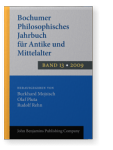Der glückliche Tod des Stoikers
Weisheit und Endlichkeit in der stoischen Philosophie
The happy death of the Stoic. Wisdom and finitude in Stoic philosophy. This paper attempts to furnish a Stoic reply to an accusation addressing the Stoics’ ideal of the wise man according to which it is impossible to realize their ideal and therefore their whole system has to face a paradox: How is wisdom possible when all people are fools and it is impossible for them to become good? In addition to this question there is another important problem connected with the ideal of wisdom. The Stoic philosophers deny transcendental ideas. Instead they are well known for their thorough-going materialism. Therefore, even their idea of the wise man must be based on experience. How would it otherwise be possible to form the idea of wisdom by a method of analogy if experience did not provide any example of truthful virtue to us? A possible answer to this problem can be found in the writings of Seneca, a Stoic of the first century A.D. Seneca emphasizes the close relation between wisdom and human mortality owing to which it is at least possible for the philosopher who has made sufficiently progress in his efforts to gain wisdom to find lasting happiness in death.
Article language: German
Cited by (1)
Cited by one other publication
Vazquez, Michael
2021.
Hopeless Fools and Impossible Ideals.
Res Philosophica 98:3
► pp. 429 ff.

This list is based on CrossRef data as of 31 july 2024. Please note that it may not be complete. Sources presented here have been supplied by the respective publishers.
Any errors therein should be reported to them.
